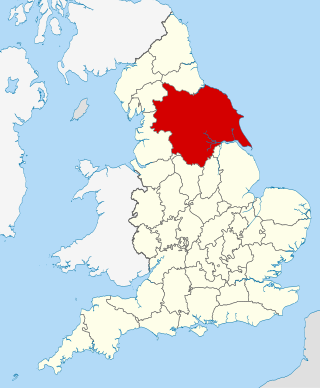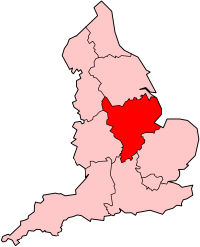Old English, or Anglo-Saxon, is the earliest recorded form of the English language, spoken in England and southern and eastern Scotland in the early Middle Ages. It developed from the languages brought to Great Britain by Anglo-Saxon settlers in the mid-5th century, and the first Old English literary works date from the mid-7th century. After the Norman conquest of 1066, English was replaced, for a time, by Anglo-Norman as the language of the upper classes. This is regarded as marking the end of the Old English era, since during this period the English language was heavily influenced by Anglo-Norman, developing into a phase known now as Middle English in England and Early Scots in Scotland.
Received Pronunciation (RP) is the accent traditionally regarded as the standard and most prestigious form of spoken British English. For over a century, there has been argument over such questions as the definition of RP, whether it is geographically neutral, how many speakers there are, whether sub-varieties exist, how appropriate a choice it is as a standard and how the accent has changed over time. The name itself is controversial. RP is an accent, so the study of RP is concerned only with matters of pronunciation; other areas relevant to the study of language standards such as vocabulary, grammar, and style are not considered.

In linguistics, specifically phonetics and phonology, schwa is a vowel sound denoted by the IPA symbol ⟨ə⟩, placed in the central position of the vowel chart. In English and some other languages, it usually represents the mid central vowel sound, produced when the lips, tongue, and jaw are completely relaxed, such as the vowel sound of the ⟨a⟩ in the English word about.
Mackem, Makem or Mak'em is a nickname for residents of and people from Sunderland, a city in North East England. It is also a name for the local dialect and accent ; and for a fan, of whatever origin, of Sunderland A.F.C. It has been used by the people of Sunderland to describe themselves since the 1980s, prior to which it was mainly used in Tyneside as a disparaging exonym. An alternative name for a Mackem is a Wearsider.

The Yorkshire dialect is a dialect of English, or continuum of dialects, spoken in the Yorkshire region of Northern England. The dialect has roots in Old English and is influenced by Old Norse. The Yorkshire dialect has faded and faces extinction, but organisations such as The Yorkshire Dialect Society and the East Riding Dialect Society exist to promote its use.

East Anglian English is a dialect of English spoken in East Anglia, primarily in or before the mid-20th century. East Anglian English has had a very considerable input into modern Estuary English. However, it has received little attention from the media and is not easily recognised by people from other parts of the United Kingdom. East Anglia is not easily defined and its boundaries are not uniformly agreed upon.
The phonological history of the English language includes various changes in the phonology of consonant clusters.
Old English phonology is necessarily somewhat speculative since Old English is preserved only as a written language. Nevertheless, there is a very large corpus of the language, and the orthography apparently indicates phonological alternations quite faithfully, so it is not difficult to draw certain conclusions about the nature of Old English phonology.
In English phonology, t-glottalization or t-glottalling is a sound change in certain English dialects and accents, particularly in the United Kingdom, that causes the phoneme to be pronounced as the glottal stop (listen) in certain positions. It is never universal, especially in careful speech, and it most often alternates with other allophones of such as [t] (help·info),, ,, or.

East Midlands English is a dialect, including local and social variations spoken in most parts of East Midlands England. It generally includes areas east of Watling Street, north of an isogloss separating it from variants of Southern English and East Anglian English, and south of another separating it from Northern English dialects. This includes the counties of Derbyshire, Leicestershire, Lincolnshire, Nottinghamshire, Rutland and Northamptonshire. Dialects of northern Derbyshire, Nottinghamshire and Lincolnshire usually share similarities with Northern English dialects. Relative to other English dialects, there have been relatively few studies of East Midlands English.
The English Dialect Dictionary (EDD) is the most comprehensive dictionary of English dialects ever published, compiled by the Yorkshire dialectologist Joseph Wright (1855–1930), with strong support by a team and his wife Elizabeth Mary Wright (1863–1958). The time of dialect use covered is, by and large, the Late Modern English period (1700–1903), but given Wright's historical interest, many entries contain information on etymological precursors of dialect words in centuries as far back as Old English and Middle English. Wright had hundreds of informants ("correspondents") and borrowed from thousands of written sources, mainly glossaries published by the English Dialect Society in the later 19th century, but also many literary texts written in dialect. In contrast to most of his sources, Wright pursued a scholarly linguistic method, providing full evidence of his sources and antedating modes of grammatical analysis of the 20th century. The contents of the EDD's nearly 80.000 entries were generally ignored during the 20th century but were made accessible by the interface of EDD Online, the achievement of an Innsbruck University research project first published in 2012 and repeatedly revised since.

The Lancashire dialect refers to the Northern English vernacular speech of the English county of Lancashire. The region is notable for its tradition of poetry written in the dialect.
The phonology of Welsh is characterised by a number of sounds that do not occur in English and are rare in European languages, such as the voiceless alveolar lateral fricative and several voiceless sonorants, some of which result from consonant mutation. Stress usually falls on the penultimate syllable in polysyllabic words, while the word-final unstressed syllable receives a higher pitch than the stressed syllable.
The English language spoken and written in England encompasses a diverse range of accents and dialects. The language forms part of the broader British English, along with other varieties in the United Kingdom. Terms used to refer to the English language spoken and written in England include: English English and Anglo-English.

Northumbrian dialect or Northumbrian English is any one of several English language varieties spoken in the traditional English region of Northumbria, which includes most of the North East England government region. The traditional Northumbrian dialect is a moribund older form of the dialect spoken in the area which is closely related to Scots and Cumbrian and shares with them a common origin in Northumbrian Old English.

Mancunian is the accent and dialect spoken in the majority of Manchester, North West England, and some of its environs. It is also given to the name of the people who live in the city of Manchester. It has been described as 'twangy' whilst also being labelled 'euphonic' and has been voted as the sexiest accent in England. Additionally it has been claimed Mancunian is one of the most desirable and friendliest accents in the UK.

The Northumbrian burr is the distinctive uvular pronunciation of R in the traditional dialects of Northumberland, Tyneside ('Geordie'), and northern County Durham, now remaining only among speakers of rural Northumberland, excluding Tyne and Wear. It is one of the few rhotic dialects left in England.
Middle English phonology is necessarily somewhat speculative, since it is preserved only as a written language. Nevertheless, there is a very large text corpus of Middle English. The dialects of Middle English vary greatly over both time and place, and in contrast with Old English and Modern English, spelling was usually phonetic rather than conventional. Words were generally spelled according to how they sounded to the person writing a text, rather than according to a formalised system that might not accurately represent the way the writer's dialect was pronounced, as Modern English is today.

William Stott Banks (1821–1872) was an English lawyer, writer, and antiquary.
On early English pronunciation: with especial reference to Shakspere [sic] and Chaucer, containing an investigation of the correspondence of writing with speech in England from the Anglosaxon [sic] period to the present day means of the ordinary printing types is an 1889 book by Alexander John Ellis. Since publication, it has been cited continuously by dialectologists of English and Scots, owing to its survey data on the dialects in the 19th century. The author is regularly cited by linguists as "A.J. Ellis" to distinguish him from Stanley Ellis, a prominent dialectologist of the 20th century.